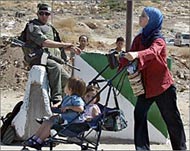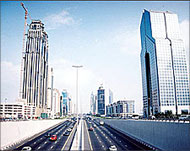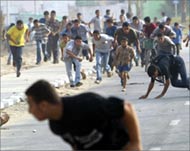Gazans trapped by Israeli border closure
Most Palestinians who work at the Rafah crossing in the southernmost edge of Gaza Strip – taxi drivers, kiosk owners and the ubiquitous men selling mint tea – know Nabil by face, if not by name.

Every day at dawn, he takes a taxi to the crossing – now Gaza’s only route to the outside world – and submits his passport to a posse of Palestinian security personnel before repeating the same procedure on the Israeli side.
He waits in the sun until about 4pm with hundreds of other weary travellers, sometimes in a taxi to which he has been assigned, sometimes alone. Then, after being denied exit by the Israelis, he returns to his home in Khan Yunis.
Of course, he does not do this out of choice.
Nabil is one of thousands of Palestinian men between the ages of 16 and 35 who have been prohibited by Israel from leaving the Gaza Strip for more than five months.
On 16 April 2004, Israeli forces, which maintain ultimate control over the Rafah terminal, informed the Palestinian Authority (PA) that they had taken the decision to ban both male and female Palestinians in this age group from travelling outside Gaza, leaving some 13% of Gaza’s population unable to receive medical treatment abroad, attend universities or return to work in foreign countries.
One month later Israeli troops lifted the ban on Palestinian women, but it remains applicable to Palestinian males to this day.
Security claim
The Palestinian Centre for Human Rights says the Israeli decision comes in the context “of the measures of the total siege and closure” imposed by Israeli occupying troops on the Gaza Strip since September 2000.
The centre estimates that thousands of Palestinians have been deprived of their civil, political, economic, social and cultural rights in this way.
The Israelis give a blanket explanation.
“The closure is based on security reasons,” says Israeli army spokesman Eytan Arusy.
 |
|
A Palestinian woman passes by |
But the men are prevented only from leaving Gaza, not from entering, so the explanation does not stand up.
When asked to explain, Arusy adds: “It’s all based on our intelligence reports and can change any time on a day-to-day basis.”
His words are of little comfort to the thousands of stranded Palestinians at risk of losing their jobs, including Nabil, or their university places.
When he came to Gaza in April 2004 for his brother’s wedding, Nabil knew of the restrictions but was confident Israel would lift them.
Vain hope
He has been commuting to the terminal daily for the last 35 days based on that hope.
“They have to change the law some time, and I am hoping it will be today, every day,” he said.
For about two weeks, his heavily pregnant wife and their two-year-old son joined him, in the hope of making it through together. Now he goes alone.
“Some times there would be up to 20 people crammed into the seven-passenger taxi, and she would have three people sitting on top of her in the August heat for over 10 hours. So I decided it was best that they stay behind in Khan Yunis.”
Collective punishment
Nabil, who works as a schoolteacher in the United Arab Emirate of Abu Dhabi, says he has most likely lost his job. He has been transferred from a high-paying model school to one of a lesser calibre, and his salary has dropped 35% as a result. Now, he says he is thinking of resigning and pursuing his masters degree.
 |
|
The contrast between life abroad |
By his side is Samir, a student in a Turkish college, who is also stuck.
He has been trying to make it through the crossing for more than a fortnight, and is at risk of losing his university place.
He tries a different strategy from Nabil. At about the same time every day, he passes around the taxis waiting to be allowed through, close to the Israeli side of the crossing. He asks if there is space for him in the hope that he may be overlooked amid the group.
His attempts are not received kindly by the passengers – not because they do not sympathise with him, but because often the Israelis will delay the taxi or send it back as a punishment.
The torturous daily routine and the uncertainty have taken their toll on many young Palestinians. One student became so frustrated he wrestled his way across the fence just a stone’s throw from the Israeli side and the Palestinian police guarding it.
He lifted his shirt to show he was unarmed but, before he made it through, the police went after him and beat him unconscious, witnesses say.
Bribes and benefits
Nabil blames the Israeli occupation, but says the PA shares part of the responsibility for a system characterised by favouritism and corruption.
 |
|
Palestinian youths run for cover |
While the decision is an Israeli one, the state of chaos on the Palestinian side aggravates the situation. Several different security branches are represented at the terminal control passengers in a way that serves their interests. Some travellers are allowed in unfairly, says Nabil, if they pay the right price.
“The Israelis say the only way you can get through under the prohibition is ‘tansiq’ – coordination. And what this basically means is pay a handsome sum to the Palestinian DCO official so he can arrange your departure with the Israelis,” Nabil explains.
“Can you tell why there are six or seven different security branches represented at the crossing? There is preventive security, intelligence, public security and even passport security. Each branch lets in whoever they want. It is all about bribes and benefits.”
Asked about the accusations, an official of the Palestinian borders and crossings office denied any wrongdoing. “They are lies,” said Mazin al-Musiria. “This is simply not true. We’re incapable of such acts anyway.”
Despair and grief
None the less Nabil says an acquaintance paid $200 to someone by the name of Ziad al-Abid, who the Israelis named as their point of contact, and who made him the same offer.
|
“Can you tell why there are six or seven different security branches represented at the crossing? There is preventive security, intelligence, public security and even passport security” Nabil, Palestinian resident of Gaza |
“I refused the offer – my conscience will not allow me to do such a thing. It is un-Islamic. I’d rather lose my job than be party to such corruption.”
Nabil says he once saw Palestinian lawmaker and adviser to Palestinian leader Yasir Arafat, Marwan Kanafani, passing through in his VIP car. Nabil stopped Kanafani to talk about the situation.
“He thought I wanted to go with him. I said: ‘No, but I want to speak to you about this situation’. He said: ‘I’ve been postponing my trip for five days now precisely to avoid seeing these scenes of despair and grief.’
“I told him: ‘You have to see them, so you can tell the world about it, so you can find a solution. You have to come every day to see what we are going through.”